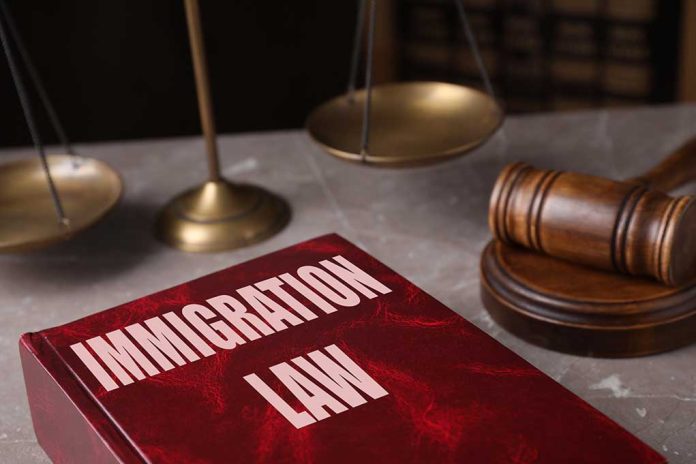
West Virginia’s Supreme Court has sidestepped a crucial legal question about whether dumping 81 million opioid pills into a single county constitutes a public nuisance, leaving communities devastated by addiction without a clear path to hold drug distributors accountable.
Key Takeaways
- West Virginia’s Supreme Court declined to rule on whether opioid distribution constitutes a public nuisance, sending the case back to federal appeals court without resolution.
- A federal judge previously ruled in favor of drug distributors who shipped 81 million opioid pills to Cabell County over eight years.
- The lawsuit sought over $2.5 billion from AmerisourceBergen, Cardinal Health, and McKesson for addiction prevention, treatment, and education programs.
- Chief Justice Bill Wooton dissented, arguing the court should have answered the question and provided guidance on public nuisance elements.
- The case represents a critical test for pharmaceutical accountability as thousands of similar lawsuits have resulted in over $50 billion in nationwide settlements.
Court Sidesteps Critical Opioid Accountability Question
The West Virginia Supreme Court has declined to answer a federal court’s question about whether the massive distribution of opioids can legally constitute a public nuisance. This decision effectively returns the high-profile case to the 4th U.S. Circuit Court of Appeals in Richmond, Virginia without providing clarity on a legal question that could determine the future of opioid litigation in the state. The case involves Cabell County and the city of Huntington, which sued three major pharmaceutical distributors for flooding their communities with an astonishing 81 million prescription pain pills over an eight-year period.
“The tragic effects of the opioid epidemic in Huntington and Cabell County are well-known and accepted by the parties,” Justice Haley Bunn wrote. “Yet, we resolve that we cannot, at this juncture, answer the question certified to this Court from the Fourth Circuit due to the disputed factual findings, and related legal conclusions resting on those factual findings, on appeal from the federal district court in this case” Stated by, Justice Haley Bunn
Drug Companies Prevail in Lower Court Decision
U.S. District Judge David Faber previously ruled in favor of the three pharmaceutical giants – AmerisourceBergen Drug Co., Cardinal Health Inc., and McKesson Corp. – finding that the distribution of opioids does not fit within the traditional scope of public nuisance law in West Virginia. Faber concluded that applying nuisance law to opioid marketing and distribution “is inconsistent with the history and traditional notions of nuisance.” This ruling dealt a significant blow to communities seeking financial compensation for the devastating impacts of the opioid crisis.
“is inconsistent with the history and traditional notions of nuisance” Stated by, Faber
The plaintiffs had sought more than $2.5 billion to fund opioid prevention, treatment, and education programs in a region that has been disproportionately affected by the opioid epidemic. In 2021 alone, Cabell County experienced a staggering number of emergency responses to overdoses, with 162 deaths reported. These statistics highlight the real-world consequences of what many see as corporate irresponsibility in distributing such enormous quantities of addictive prescription medications to a relatively small population.
Divided Court Leaves Legal Question Unresolved
The state supreme court’s decision reveals deep divisions among the justices about whether to provide guidance on this complex legal issue. Justice Beth Walker issued a separate concurring opinion, emphasizing that declining to answer the federal court’s question was not taken lightly. Meanwhile, Chief Justice Bill Wooton strongly dissented, arguing that the court had a duty to provide an answer and establish clear guidelines for what constitutes a public nuisance in cases involving opioid distribution.
“I believe this Court has the duty and responsibility to answer the certified question posed to us by the Fourth Circuit. In that regard, I would answer the first part of the question in the affirmative and provide guidance as to the elements of a public nuisance cause of action as set forth herein” Stated by, Chief Justice Bill Wooton
Adding another layer of complexity to the case, two justices disqualified themselves from hearing the matter, requiring circuit judges Tera Salango and Andrew Dimlich to temporarily join the court for this decision. The absence of a definitive ruling is particularly significant given that the West Virginia Mass Litigation Panel has previously concluded that opioid distribution can form the basis of a public nuisance claim, creating potential inconsistencies in how similar cases might be handled throughout the state.
Fight Continues as Communities Seek Justice
Despite this setback, attorneys representing the affected communities have vowed to continue their legal battle. The case now returns to the federal appeals court, which must determine how to proceed without the state-level clarification it had sought. This ongoing litigation is part of a broader national effort to hold pharmaceutical companies accountable for their role in fueling the opioid crisis, with thousands of similar lawsuits filed by state and local governments across the country, many of which have resulted in settlements totaling over $50 billion.
“The fight isn’t over. There’s still a long way to go. We continue on our path to seek justice” Stated by, Paul Farrell
The non-decision by West Virginia’s highest court leaves communities like Huntington and Cabell County in a precarious position as they continue to grapple with the devastating human and financial costs of widespread opioid addiction. For residents who have lost loved ones to overdoses or seen their communities ravaged by the crisis, the court’s unwillingness to answer a fundamental legal question about corporate accountability represents yet another frustrating delay in their quest for meaningful remedies and justice.



